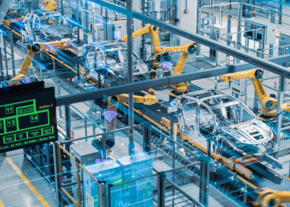
Electric cars, 164 million expected to circulate in China, Europe and the US by 2030
Editorial Staff
According to an analysis made by the Autopromotec Observatory, based on a study carried out by the international consulting firm PwC, in 12 years, volumes will go up by as much as over 65 times the 2.5 million vehicles recorded in 2017.
By 2030 the expected number of electric vehicles in circulation in the world's largest automotive markets (China, Europe, United States) will reach 164 million units, increasing volumes by over 65 times compared to the 2.5 million units recorded in 2017. Looking at markets, China, which is already the world's leader in terms of diffusion of electric vehicles with 1.2 million units in circulation in 2017, will significantly strengthen its leadership reaching 73.7 million by 2030. Following, but rather far behind, we find Europe and the United States with 45.4 and 45 million units respectively. These forecasts stem from data processed by the Autopromotec Observatory on the basis of a study carried out by the international consulting firm PwC, which analyzed current and future trends in the automotive market, with a focus on medium-long term trends: electric mobility, connectivity, autonomous driving.
As shown in the following chart, electric vehicles will gradually increase their market penetration until 2020, and then accelerate significantly from 2025. According to the PwC study, the spread of electric cars will be driven by increasingly stringent government regulations on emissions, from more accessible charging point networks, as well as an expected fall in battery prices.
Electric cars will therefore be increasingly important in tomorrow’s mobility. Naturally, according to the Autopromotec Observatory, the transition to electric mobility will require considerable efforts on the part of new recharging infrastructures suppliers, by governments, called upon to create an adequate regulatory framework as well as new standards on incentives, and the automotive industry as a whole, currently sinking large amounts of cash in improving battery performance obtaining as a consequence greater mileage. Even the garage world will be strongly affected by this electric revolution. Car repairers must be ready to get their hands “dirty” on these types of cars, whose ordinary and extraordinary maintenance requires greater attention compared to more traditional combustion engines. For example, no spark-plugs replacement is expected on an electric motor, not to mention injectors or air, fuel and oil filters and no emission tests are required either.
Maintenance, in this case, will centre on everything that concerns the electrical sector which, being often quite sophisticated, will requires expertise and skilled attention. Monitoring the efficiency of the battery packs (a fundamental element in this type of vehicle) will be particularly important, along with regular checks on control units and other components such as inverters, electric motors, etc.. Naturally, in addition to taking into account the directions coming directly from the manufacturers for each individual vehicle, the maintenance of an electric car cannot neglect routine work on a vehicle’s setup, its tires and shock absorbers as well as headlights, braking system, windshield wipers etc., all aimed at enhancing safety and comfort. In addition to familiarity with the basics of electrical engineering and how electric cars actually work, mechanics must also be trained and informed about safety procedures and protective measures to be taken when operating in contact with or in the vicinity of live parts (the output of an electric unit can reach values of several hundred volts).
Electric car maintenance, in short, presents specific critical issues that should not be overlooked, both when it comes to the use of proper equipment and on-going staff training. As electric cars increase in popularity, the task of tomorrow’s repairers will be to focus on greater specialization, acquiring new skills and investing in technology and training to ensure effective, high-quality after-sales services. These issues, and much more, will be thoroughly discussed during the Autopromotec Conference, scheduled on June 13 and 14 at the Unipol Arena in Casalecchio di Reno (BO).
As shown in the following chart, electric vehicles will gradually increase their market penetration until 2020, and then accelerate significantly from 2025. According to the PwC study, the spread of electric cars will be driven by increasingly stringent government regulations on emissions, from more accessible charging point networks, as well as an expected fall in battery prices.
| 2017 | 2020 | 2025 | 2030 | |
| China | 1.2 | 4.0 | 20.5 | 73.7 |
| Europe | 0.8 | 1.5 | 9.5 | 45.4 |
| Usa | 0.5 | 2.2 | 11.3 | 45.0 |
| Total | 2.5 | 7.6 | 41.2 | 164.0 |
Electric cars will therefore be increasingly important in tomorrow’s mobility. Naturally, according to the Autopromotec Observatory, the transition to electric mobility will require considerable efforts on the part of new recharging infrastructures suppliers, by governments, called upon to create an adequate regulatory framework as well as new standards on incentives, and the automotive industry as a whole, currently sinking large amounts of cash in improving battery performance obtaining as a consequence greater mileage. Even the garage world will be strongly affected by this electric revolution. Car repairers must be ready to get their hands “dirty” on these types of cars, whose ordinary and extraordinary maintenance requires greater attention compared to more traditional combustion engines. For example, no spark-plugs replacement is expected on an electric motor, not to mention injectors or air, fuel and oil filters and no emission tests are required either.
Maintenance, in this case, will centre on everything that concerns the electrical sector which, being often quite sophisticated, will requires expertise and skilled attention. Monitoring the efficiency of the battery packs (a fundamental element in this type of vehicle) will be particularly important, along with regular checks on control units and other components such as inverters, electric motors, etc.. Naturally, in addition to taking into account the directions coming directly from the manufacturers for each individual vehicle, the maintenance of an electric car cannot neglect routine work on a vehicle’s setup, its tires and shock absorbers as well as headlights, braking system, windshield wipers etc., all aimed at enhancing safety and comfort. In addition to familiarity with the basics of electrical engineering and how electric cars actually work, mechanics must also be trained and informed about safety procedures and protective measures to be taken when operating in contact with or in the vicinity of live parts (the output of an electric unit can reach values of several hundred volts).
Electric car maintenance, in short, presents specific critical issues that should not be overlooked, both when it comes to the use of proper equipment and on-going staff training. As electric cars increase in popularity, the task of tomorrow’s repairers will be to focus on greater specialization, acquiring new skills and investing in technology and training to ensure effective, high-quality after-sales services. These issues, and much more, will be thoroughly discussed during the Autopromotec Conference, scheduled on June 13 and 14 at the Unipol Arena in Casalecchio di Reno (BO).
On the same topic
#Full electric vehicles, still too expensive#Electric vehicles, still short of a true “green” revolution


























